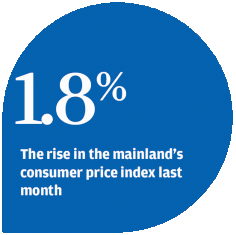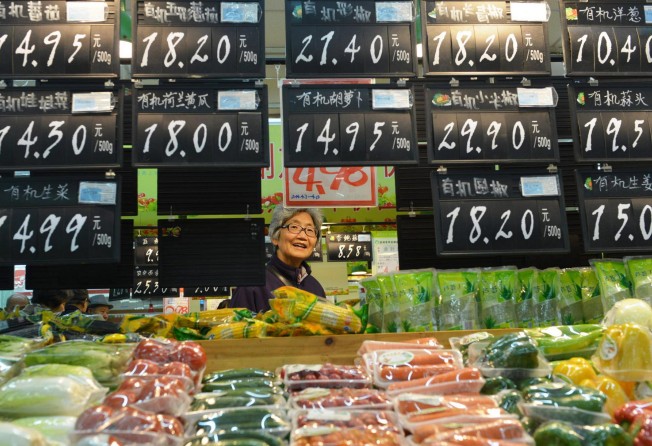
Mainland China's inflation rate falls to an 18-month low
Decline prompts demands for more monetary stimulus by China's central bank to lift growth as fears grow of a hard landing for the economy

The mainland's inflation rate hit an 18-month low in April, fuelling more talk about the need for the central bank to ease monetary policy amid concerns about cooling economic growth.

The producer price index declined 2 per cent from a year earlier, marking the 26th consecutive monthly fall, data from the National Bureau of Statistics showed yesterday.
A desire for benign inflation prompted more researchers to join the camp urging the government to make further efforts to boost growth.
"[The] inflation release suggest that disinflationary pressure is building if not escalating," said HSBC economists Qu Hongbin and Ma Xiaoping in a research report. "This calls for more steps towards policy easing in the coming months."
They expect the central bank to keep a relatively accommodative monetary policy by guiding long-term interest rates lower to facilitate public infrastructure investment projects and a targeted easing aimed at supporting small and medium-sized enterprises.
The People's Bank of China has so far resisted massive monetary easing, despite the market average lending rate reaching more than 7 per cent, making it tougher for companies to make a profit.
In its quarterly monetary policy report, the central bank pledged to maintain the prudent policy stance, although it left its options open, including using tools such as cutting banks' reserve requirement ratio, to flexibly adjust money supply as needed.
Relaxing monetary policy is a double-edged sword as it may fuel more financial risks in China. It may also hurt Beijing's aim to transform the mainland's economic growth model to make it less reliant on artificial stimulus and driven more by intrinsic demand. Premier Li Keqiang has stated that the country will not repeat the old ways of resorting to stimulus to fuel growth.
"The worry is that monetary easing could cause the credit to flow into high-risk borrowers [real estate, local government financing platforms, manufacturers in overcapacity industries], like what has happened in the past. This will compromise the efforts to contain further increases in financial imbalances," said JP Morgan China chief economist Zhu Haibin.
Still, some worry that failing to introduce supportive policies in a timely manner risks sending the economy towards a hard landing, particularly after home demand in cities, including Beijing, cooled recently, indicating weaker economic growth ahead.
Some analysts again called on the central bank to cut the reserve ratio out of fear that more widespread property price cuts could dampen production in sectors such as cement and steel.
The question is how slow a growth rate would Beijing tolerate or find acceptable.
China's gross domestic product growth slowed to 7.4 per cent in the first quarter from 7.7 per cent in the previous three months, lower than Beijing's annual target of "about" 7.5 per cent. But Citigroup said the real GDP growth could be far weaker than officially reported - it might have hit as low as 6 per cent year on year in the first quarter.